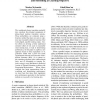Free Online Productivity Tools
i2Speak
i2Symbol
i2OCR
iTex2Img
iWeb2Print
iWeb2Shot
i2Type
iPdf2Split
iPdf2Merge
i2Bopomofo
i2Arabic
i2Style
i2Image
i2PDF
iLatex2Rtf
Sci2ools
120
click to vote
EMNLP
2008
2008
Phrase Translation Probabilities with ITG Priors and Smoothing as Learning Objective
The conditional phrase translation probabilities constitute the principal components of phrase-based machine translation systems. These probabilities are estimated using a heuristic method that does not seem to optimize any reasonable objective function of the word-aligned, parallel training corpus. Earlier efforts on devising a better understood estimator either do not scale to reasonably sized training data, or lead to deteriorating performance. In this paper we explore a new approach based on three ingredients (1) A generative model with a prior over latent segmentations derived from Inversion Transduction Grammar (ITG), (2) A phrase table containing all phrase pairs without length limit, and (3) Smoothing as learning objective using a novel Maximum-A-Posteriori version of Deleted Estimation working with Expectation-Maximization. Where others conclude that latent segmentations lead to overfitting and deteriorating performance, we show here that these three ingredients give performa...
EMNLP 2008 | Natural Language Processing | Phrase Pairs | Phrase Translation | Reasonable Objective Function |
| Added | 29 Oct 2010 |
| Updated | 29 Oct 2010 |
| Type | Conference |
| Year | 2008 |
| Where | EMNLP |
| Authors | Markos Mylonakis, Khalil Sima'an |
Comments (0)

